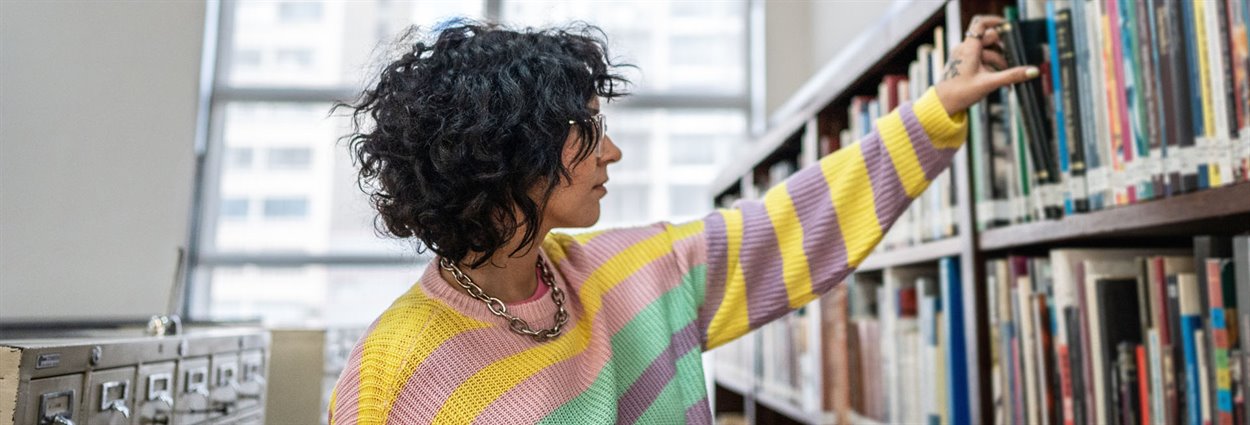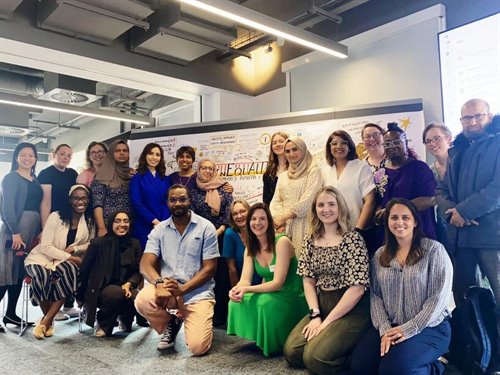
Members of The Hildas have taken part in a wide range of research-related patient and public involvement and engagement (PPIE) activities. These are some recent examples:
Health inequalities workshop
Members of The Hildas supported us with delivery of a workshop that took place on International Women’s Day 2024. They shared their lived experiences of PolyCystic Ovary Syndrome (PCOS) and high-risk pregnancies to raise awareness and inspire others to take action. The event entitled ‘Inspiring inclusion in women’s health research to tackle health inequalities’ brought together researchers, wider university staff and members of the public to discuss and identify suggestions on how to tackle health inequalities for women.
“I wanted to raise awareness of some of the specific cultural challenges and stigma that South-Asian women with PCOS face. I collaborated with other South-Asian women who had PCOS to co-create a video highlighting some of these aspects. The video was intentionally humorous but the message underneath it was really serious. It was great to see people’s reactions and to see how it got people at the workshop thinking about how culture can play a big role in women’s health.” - Sunila
“Women from other cultural backgrounds are often seen as a problem because of lack of understanding. Perhaps if they are treated as active partners in their own care, there will be opportunities to learn a lot more than we do now. I wanted to share my personal story because I don’t want another woman to go through what I did. Unfortunately, women still do face many of the same issues. Racism and lack of cultural understanding is part of the issue and migrant women are still judged. That’s why it is important that those of us who can do get involved in supporting future research on women’s health, because we need to include all voices.” – Ester


Sharing best practice across the globe
In 2023, two members of The Hildas joined researchers and staff from the WHO Collaborating Centre for Global Women’s Health at University of Birmingham for a 3-day workshop in Cape Town, South Africa. The event focused on sharing best practice in patient and public involvement and engagement (PPIE) with colleagues from the Global South, including research teams and other PPIE representatives from South Africa, Tanzania, Ghana, Uganda, Malawi, Kenya and India. The workshop also started collaborative development of a global framework for PPIE centred on the health of women and girls. The Hildas gave presentations about their personal motivations for undertaking PPIE activities, as well as talking about the skills, networks and opportunities they had gained through this type of work. For example, opportunities to join research funding panels and to be involved in grant development related to topics they are passionate about. Their stories helped inspire other attendees with the possibilities and impact of PPIE. The Hildas also played a key role in helping facilitate some of the discussions and co-design sessions, through providing suggestions and recommendations based on their own experiences.



Royal College of Obstetrics and Gynaecology workshop
In May 2024, members of The Hildas attended a stakeholder dissemination event titled “Bridging gaps in women’s health and pregnancy safety” at the Royal College of Obstetricians and Gynaecologists, in London. The research team have developed a calculator that can improve the ability to predict which babies will be at risk of fetal growth restriction in the womb, from the first booking-in appointment with a healthcare professional. The calculator can also accurately predict the birthweight of the baby at any point during the pregnancy. This is important as early detection of risk can increase monitoring throughout the pregnancy, and help to prevent stillbirth and neonatal death, and severe complications through unnecessary early delivery. The team used the event as an opportunity to present the calculator and to obtain feedback from stakeholders using a range of interactive tools and activities. In particular, the group were asked to comment on the useability, usefulness, acceptability, and ease of integration with current practices of the calculator.
A second follow-up workshop was held virtually, where The Hildas were invited to provide feedback on an animation storyboard that had been drafted by an external company to help explain the research and development behind the calculator to a public audience. A great discussion was had on various elements such as the wording, the images, and the messages that each scene was portraying. Once the animators have incorporated this feedback into a second draft, The Hildas will again be invited to provide further feedback.

Community engagement on PCOS
Over the past couple of years, some of The Hildas with polycystic ovary syndrome (PCOS) have also supported us to disseminate findings from our DAISy-PCOS research project at various local community festivals. This has included CoCoMad Festival and the Birmingham Mela Festival – which is the UK’s biggest South Asian music and arts festival. This enabled us to interact with a highly ethnically diverse audience and to also position science alongside music, art, food and wider culture. We engaged audiences with our PCOS ‘myth-busting’ quiz and also invited visitors to share their reflections and thoughts on PCOS and women’s health. The event also helped with recruitment, as we also had several women express an interest in joining the The Hildas and it was a great opportunity for them to hear directly from others already involved. In future we are looking at other festivals such as Simmer Down Festival which has a large Black, Black British and Afro-Caribbean community in attendance. This way we hope to share our research and reach an even wider and more diverse audience over time.

